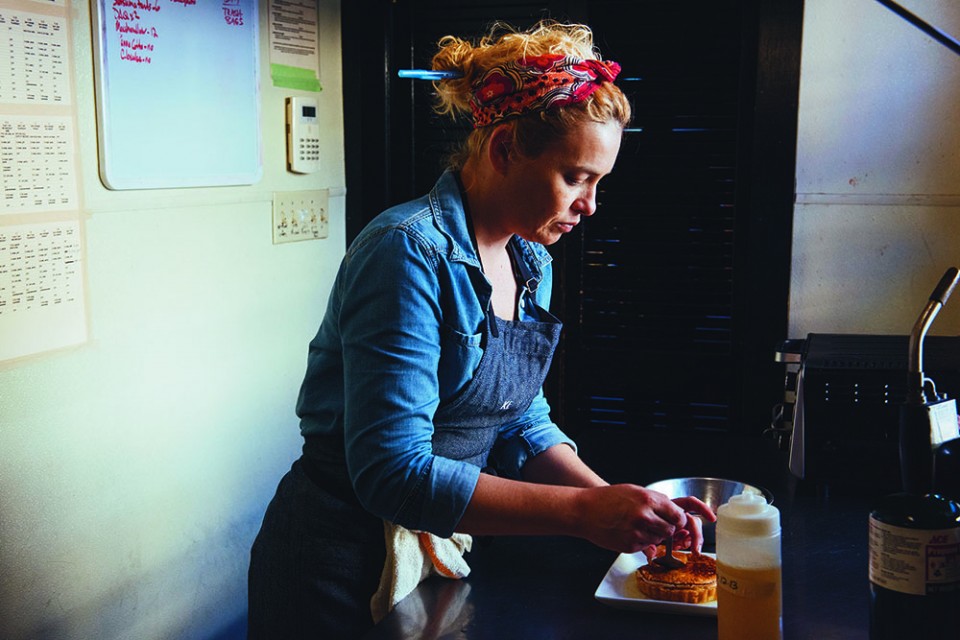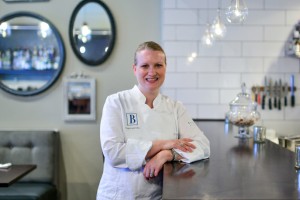Kristen Essig, Chef at New Orleans Restaurant, Meauxbar
Working in New Orleans (that fabled, French-infused city!) at a French-infused restaurant, Meauxbar, and knowing that you’re doing what you love – that’s Kristen Essig’s life. She got the drive towards a culinary career early, with lots of memories of family-filled Sunday dinners at her grandparents’ house, and later attained the skills she need at the renowned Johnson and Wales cooking school. She subsequently worked at the New Orleans restaurant Ste. Marie, among others, and was then hired by boss Robert LeBlanc to helm the kitchen at Meauxbar (check out its cooler-than-thou website, with lovely, retro-inspired photo).
Essig gives props in this interview to three cherished elements of her working life: her dedicated, carefully selected kitchen team; a mentor, Anne Kearney, who influenced her professional style; and boss Robert LeBlanc, who has the hugely valuable instincts about hospitality and quality control that can make or break a restaurant.
She also has a boyfriend in the biz (he has his own restaurant, Coquette), and in the interview below, seems to be an example of someone who understands fully the maxim of “if you do something you love, you’ll never work a day in your life.” See also: lots of interesting recommendations about food items, and thoughts on the never-ending balancing act of work and personal life common to all professionals.
When and how did you start cooking?
I started cooking at home with my mother and grandmother at a very young age. My sister and I would spend the weekends with my grandparents, and we would all enjoy a dinner on Sunday night when our parents came to pick us up. My grandmother was a fantastic cook — she loved sharing food with people she loved.
I started working in professional kitchens when I was around fifteen, including a little bit of “front of the house” (FOH) work. I always enjoyed the hospitality side of serving, but I was a horrible waitress. Ha!
How long before you realized you were going to be making a living off cooking?
One of the things that was most important in my family, growing up, was a family dinner every night. My mother worked full-time (as did my father), but she always had dinner on the table. I learned a lot about my parents sitting at this table. The most important being was how unsatisfied they were with their jobs when I was younger. I remember being shocked that they didn’t love what they did every day, that work, for them, was an obligation, a sacrifice that they made for us (their children).
So before I knew that I wanted to cook for a living, I knew that I wanted to be happy with what I was doing every day (I was also highly motivated by not wanting to wear pantyhose to work everyday, ha!) I knew early on, by high school, that I wanted to work in food. I went straight to culinary school, after high school, and worked full time in professional kitchens at the same time.
I was fortunate enough to attend Johnson & Wales [cooking school] in Charleston, and made it thru two years there before deciding that I wanted to garner more “real life” experience by working solely in professional kitchens. I think the things that drew me to working as a cook, and eventually as a chef, where the camaraderie of the kitchen, the relationships with vendors, and the ability to create a fantastic experience, to make diners happy, in the moment, right there. It’s extremely tangible, satisfying work.
Is there anyone who’s been a big influence on how you cook, and how you lead in the kitchen?
I consider Chef Anne Kearney to be my mentor. I’ve had the great pleasure of working for many chefs, but Anne was the first female chef for whom I worked, and the chef who asked the most of me as a professional. While the fact that she was a women influenced me directly, she never taught me any differently than the male cooks who worked for her. Her leadership, integrity and commitment directly influence almost every decision I make, every lesson I try to teach, and the philosophes that I embody with my own work, in my own kitchen.
And Robert LeBlanc, the current owner of my restaurant, Meauxbar, is my business mentor. While we may not always agree, he is the one who has developed me into the leader I’ve come to be. His focus on hospitality is unfaltering, and he creates an amazing restaurant culture that focuses on respect for every member of our team. He’s really helped me grow as a chef, and his lessons will surely influence me when I decide to become an owner as well.
What are your favorite ingredients you like to work with?
I’m a huge fan of fresh herbs, citrus zest and oils — items that I feel can influence a dish at the beginning, the end and in the “in between.” All are delicate and can be very flexible, while still making an impact.
How do you ensure quality and control in your kitchen?
We pride ourselves on the freshness of our ingredients and prepared products. We have strict “shelf life” restrictions on every product that we make. The physical size (that being small!) of our kitchen also forces us to work in small batches, so we have room for all of it.
The main way I control the quality in our kitchen is through the people we employ. I take great pride in the people who earn their living in our restaurant. Every single person has great pride, passion and dedication for what they do. I would be nothing without them. The same can be said for our suppliers: we have personal relationships with all of them, and we realize how lucky we are to work with them in creating beautiful and delicious food.
How do you make the food in your restaurant your own?
The food in our restaurant is not just mine — it’s ours! We make sure it’s a team effort — it’s the result of a team of people, and it’s for our diners; we create dishes for our guests, not for ourselves. There is very little that I do solely by myself.
How do you balance creativity and business?
Quite honestly, I’m still learning how to do this, but surrounding yourself with dedicated, supported staff is the only way to do more, and be both creative and business-minded. We try to be very diligent about our costs, for both labor and food, but in the end, you get out of your business what you put in.
How did you plan out your career?
There is very little in my career that I planned. I’ve always tried to do what is best for myself by taking care of others. When I’ve been dissatisfied with what I ‘m doing, I look for something new. I ask for more. I ask for advice from people I love and respect.
Asking for help is probably one of the most important life lessons I’ve learned along the way. You don’t get what you don’t ask for. My advice: work hard, don’t pass the buck, and be committed and dedicated.
Is there a particular cookbook that you refer to more than others?
This changes often. Cookbooks are so different now; most are made by chefs, for chefs. I’d say right now, I’m enjoying the Bar Tartine and Astrance Cookbooks.
Do you have any humbling or humorous anecdotes from your career?
I make a fool of myself everyday. I can be very clumsy. No one particular anecdote stands out!
How do you juggle your personal life on top of being in the demanding food industry?
The easiest way to answer this question would be…”I don’t.” Quite honestly, I’m a very fortunate woman. I’m in a very happy, loving relationship with a good man who is also a chef. We share the same hours and “problems.” We share and support each other at home, and I have an amazing group of girlfriends that gives me lots of support, even though I’m absent, physically, for long stretches of time. My family is extremely patient and supportive. I’m lucky to be as loved as much as I am, even if I’m not the best friend/daughter/sister these days.
So this is, without question, the hardest part of my job. Balance is a constant challenge. My respect for female chefs/professional women who also have children is boundless. I don’t know how I would do it. Children are not a personal priority for me.
Do you have a Chef’s Kitchen at home?
Yes. Do we use it? No!
Where do you go when you go out to eat?
Lots of places….Peche, Bistro Daisy, La Boca, Primotivo, Sylvain, 1000 Figs, Coquette (my very talented boyfriend’s restaurant!).
Are there any local places you want to try?
It’s a great time in New Orleans; there are literally new restaurants opening every week. So…yes, but the list changes daily.
What is your favorite city to travel to for amazing food?
NYC is probably my favorite, but there are some amazing towns I need to explore more, like San Antonio, Chicago, Philadelphia, and Montreal. So much to see/eat/do, so little time!
What exotic food do you think everyone needs to try at least once?
I think everyone should try everything (food-wise) at least once, exotic or not.
What are the advantages you’ve experienced as a woman in the food industry?
The only advantage that I feel I’ve received for being a woman is quite honestly, getting more publicity for being a woman, instead of just being a chef. I don’t want to be the “best female” anything, I just want to be the best. That being said, I want to be my personal best. It’s nice to be recognized by others, but in the end, if I don’t actually believe I’m doing my best work, no list is going to convince me otherwise. Flattering, of course — but not personally affirming.
What advice do you have for women considering a career as a chef or in the food business?
Work hard, be who you are, and don’t make it about your gender — make it about your dedication and commitment to your craft.
What is the key to your success- in three words?
Work hard daily!
What’s next for you?
Not sure, but more!
TAGS: Female Chef
 Interviewer Interview Prep
Interviewer Interview Prep Impactful Mentees
Impactful Mentees Benefits of a Mentor
Benefits of a Mentor Advice for First-Time Managers
Advice for First-Time Managers Overcoming the 18-month Itch
Overcoming the 18-month Itch Dressing for Your Style
Dressing for Your Style Interview Style Tips
Interview Style Tips Women's Stocking Stuffers
Women's Stocking Stuffers Gift the Busy Traveler
Gift the Busy Traveler Father’s Day Gift Guide
Father’s Day Gift Guide Airport Layover Activities
Airport Layover Activities Traveling & Eating Healthy
Traveling & Eating Healthy Travel Like a Boss Lady
Travel Like a Boss Lady The Dual California Life
The Dual California Life Gifts for Thanksgiving
Gifts for Thanksgiving Summer Reading List
Summer Reading List Top Leisurely Reads
Top Leisurely Reads New Year, New Books
New Year, New Books Life Lessons from a Sitcom
Life Lessons from a Sitcom Oprah, Amy or Amal?
Oprah, Amy or Amal?







